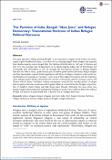Files in this item
The partition of India, Bengali “new Jews,” and refugee democracy : transnational horizons of Indian refugee political discourse
Item metadata
| dc.contributor.author | Banerjee, Milinda | |
| dc.date.accessioned | 2022-09-30T14:30:02Z | |
| dc.date.available | 2022-09-30T14:30:02Z | |
| dc.date.issued | 2022-09-29 | |
| dc.identifier | 279750003 | |
| dc.identifier | 28c49f46-b0a5-40b1-ba96-1889056b4760 | |
| dc.identifier | 000861641900001 | |
| dc.identifier | 85142024347 | |
| dc.identifier.citation | Banerjee , M 2022 , ' The partition of India, Bengali “new Jews,” and refugee democracy : transnational horizons of Indian refugee political discourse ' , Itinerario , vol. 46 , no. 2 , pp. 283-303 . https://doi.org/10.1017/S0165115322000092 | en |
| dc.identifier.issn | 0165-1153 | |
| dc.identifier.other | ORCID: /0000-0001-7657-5626/work/120051507 | |
| dc.identifier.uri | https://hdl.handle.net/10023/26111 | |
| dc.description.abstract | This essay advocates “refugee political thought” as an autonomous category which needs to be centre-staged in global intellectual history. I concretise this by studying Bengali Hindu refugees who migrated from Muslim-majority eastern Bengal (after the Partition of British India in 1947 part of Pakistan, and after 1971, the sovereign state of Bangladesh) to the Hindu-majority Indian state of West Bengal, and occasionally their descendants as well. By studying the transnational horizons of Bengali refugees from the late 1940s to today, I posit them as part of modern global intellectual history. Bengali refugees and their descendants connected their experiences with those of refugees elsewhere in the world, seeing themselves, for example, as “new Jews.” Later, some of them aligned themselves with the Palestinian cause. Refugee politics became enmeshed with Cold War revolutionary currents. European, Soviet, and Chinese Marxist theory—and latent Lockean assumptions—propelled the everyday politics of refugee land occupation. Marxism, sometimes with Hegelian inflection, nourished the East Bengali-–origin founders of Subaltern Studies theory and Dalit (lower-caste) thought. Ultimately, this essay shows how Bengali refugees instrumentalised transnational thinking to produce new models of democratic political thought and practice in postcolonial India. I describe this as “refugee democracy.” | |
| dc.format.extent | 21 | |
| dc.format.extent | 393790 | |
| dc.language.iso | eng | |
| dc.relation.ispartof | Itinerario | en |
| dc.subject | Refugee intellectual history; refugee political thought | en |
| dc.subject | Refugee democracy | en |
| dc.subject | Indian refugees | en |
| dc.subject | Bengali refugees | en |
| dc.subject | New Jews | en |
| dc.subject | India | en |
| dc.subject | West Bengal | en |
| dc.subject | Pakistan | en |
| dc.subject | Partition | en |
| dc.subject | Refugee political thought | en |
| dc.subject | DS Asia | en |
| dc.subject | JV Colonies and colonization. Emigration and immigration. International migration | en |
| dc.subject | T-NDAS | en |
| dc.subject | SDG 10 - Reduced Inequalities | en |
| dc.subject | SDG 16 - Peace, Justice and Strong Institutions | en |
| dc.subject | MCC | en |
| dc.subject.lcc | DS | en |
| dc.subject.lcc | JV | en |
| dc.title | The partition of India, Bengali “new Jews,” and refugee democracy : transnational horizons of Indian refugee political discourse | en |
| dc.type | Journal article | en |
| dc.contributor.institution | University of St Andrews. School of History | en |
| dc.contributor.institution | University of St Andrews. St Andrews Centre for the Receptions of Antiquity | en |
| dc.identifier.doi | https://doi.org/10.1017/S0165115322000092 | |
| dc.description.status | Peer reviewed | en |
| dc.identifier.url | https://www.cambridge.org/core/journals/itinerario/issue/DF501A6934E90B51009A76AFEA02CF57 | en |
This item appears in the following Collection(s)
Items in the St Andrews Research Repository are protected by copyright, with all rights reserved, unless otherwise indicated.

